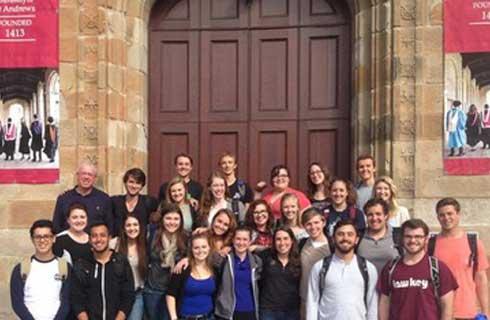学校心理学哲学博士
Doctor of Philosophy in School Psychology

学历文凭
Ph.D.

专业院系
College of Liberal Arts and Social Sciences (CLASS)

开学时间

课程时长

课程学费

国际学生入学条件
- A bachelor's degree from a regionally accredited institution.
- A minimum cumulative undergraduate GPA of 2.7.
English Language Requirements:
- (TOEFL): A score of 500 PBT/61 IBT is required for admission with stipulations or 550 PBT/79 IBT for regular admission.
- (IELTS): A score of 5.5 required for admission with stipulations or 6.5 for regular admission.
- Pearson Test of English: A score of 44 for admission with stipulations or 53 for regular admission.
- Michigan English Test (MET): A score of 52 is required for regular admission.
- International Baccalaureate (IB): A grade of 5 in English at the Higher Level is required for regular admission.
- Advanced Placement (AP): A score of 4 on the English Language or English Literature Exams.
- General Certificate of Secondary Education (GCSE) or General Certificate of Education (GSE): a score of A or B on the English Language Exam.
- SAT Evidence-based Reading and Writing (EBRW) score of 520
- ACT English score of 21.
- ELS Language Center Program: Completion of Level 112 for regular admission.
- ELI (CMU English Language Program): Successful completion of the required CMU ELI courses with confirmation by the ELI Office.
IDP—雅思考试联合主办方

雅思考试总分
6.5
- 雅思总分:6.5
- 托福网考总分:79
- 托福笔试总分:550
- 其他语言考试:Pearson Test of English (PTE) score of 53.
CRICOS代码:
申请截止日期: 请与IDP联系 以获取详细信息。
课程简介
Accredited by the American Psychological Association (APA)1, the Doctor of Philosophy in School Psychology is designed to extend the training of the specialist-level school psychologist so that he or she is prepared to serve educational systems and the larger community. The program prepares school psychologists who can perform a variety of roles in the delivery of mental health services; who can assume a leadership role in the development of comprehensive and effective educational and psychological services to children, families, and schools; and who are able to supervise, coordinate, and direct the activities of others in the delivery of school psychological services.<br><br>The training model is based on the scientist-practitioner tradition emphasizing the application of behavioral science in educational systems and the larger community. Training emphasizes practice guided by scientific knowledge. Students are taught to use scientific principles to inform their practice (including consultation, intervention, and diagnostic services) and to evaluate their practice in order to improve services as well as contribute to the field of School Psychology. The program is committed to fostering in its students sensitivity to, appreciation for, and understanding of ethnic minority group members. Similarly, the program strives to promote understanding of, and responsiveness to, the special needs of individuals with disabilities.
相关申请
 预科
预科 奖学金
奖学金 实习机会
实习机会 在校学习
在校学习 跨境学习
跨境学习 校园授课-线上开始
校园授课-线上开始 在线/远程学习
在线/远程学习
开学时间&学费
学费信息仅供参考,请与IDP联系以获取详细信息
| 开学时间 | 时长 | 学费 | 地点 |
|---|
本校相关课程

Graduate Certificate in Health Services Administration
学历文凭
Graduate Certificate
开学日期
课程费用总额


学校心理学哲学博士
学历文凭
Ph.D.
开学日期
课程费用总额


Doctor of Philosophy in Applied Experimental Psychology
学历文凭
Ph.D.
开学日期
课程费用总额


Doctor of Philosophy in Clinical Psychology
学历文凭
Ph.D.
开学日期
课程费用总额


工业和组织心理学哲学博士
学历文凭
Ph.D.
开学日期
课程费用总额


物理治疗博士学位
学历文凭
Ph.D.
开学日期
课程费用总额

其他相关课程

Advanced Doctor of Psychology in School Psychology
 菲尔莱狄更斯大学
菲尔莱狄更斯大学学历文凭
Ph.D.
开学日期
课程费用总额


Doctor of Philosophy in School Psychology
 北卡罗来纳大学教堂山分校
北卡罗来纳大学教堂山分校学历文凭
Ph.D.
开学日期
课程费用总额


学校心理学专家
 西伊利诺伊大学
西伊利诺伊大学学历文凭
First-Professional Degree
开学日期
课程费用总额


Master of Arts in Psychology - School Psychology
 洪堡州立大学
洪堡州立大学学历文凭
Masters Degree
开学日期
课程费用总额


Doctor of Psychology in School Psychology
 杜肯大学
杜肯大学学历文凭
Ph.D.
开学日期
课程费用总额


教育心理学专家
 贡萨加大学
贡萨加大学学历文凭
Ph.D.
开学日期
课程费用总额











